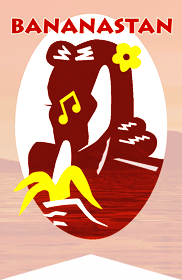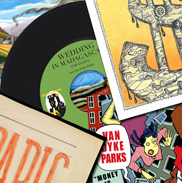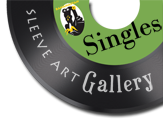
7" Singles Series by Van Dyke Parks
This handsomely packaged VDP singles project is now out of print and thus no longer in stock. However the 12 tracks have been shrewdly gathered together and are available in album form as Songs Cycled.
Personnel
Produced by: Van Dyke Parks and Matthew Cartsonis
Vocals: VDP and Inara George
Violins: Peter Kent
Cello: Cameron Stone
Electric Bass: Leland Sklar
Percussion: Don Heffington
Musette: VDP (MIK)
Acoustic Guitar: VDP (MIK)
Mandocello: Matt Cartsonis (MIK)
Mixed by: Bil Lane at Jackson Browne's
Groovemaster Studios, Santa Monica, Ca.
Assistant Mix Engineer: Rich Tosi
Other Info
Catalogue No: B4500
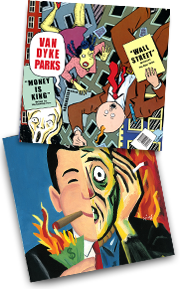
The first release, Wall Street (VDP) commemorating the fallen of 9/11, b/w Money is King (Neville Marcano, aka Growling Tiger, additional lyrics VDP; arranged and adapted VDP) which addresses the universal issue of greed. The sleeve illustrations, 'Towers' and 'Excess', are by Pulitzer Prize-winning Art Spiegelman.
Imaginary Liner Notes — 'Wall Street' and 'Money Is King' reviewed by Michael Leddy:
In 2003, an earlier version of 'Wall Street' was briefly available as a free download from Parks' website. Comparing the two recordings is instructive: the new 'Wall Street' has more varied instrumentation and a far stronger sense of theater, pausing and slowing down now and then for maximal dramatic effect. 'Wall Street' is a 9/11 song, beginning with the biz-talk and chatter of a workday ("Drop me off at Walk Don't Walk") before turning to ash, blood, and confetti, and the indelible image of a man and woman holding hands as they fall to the pavement. Yes, that happened, and this song remembers.
'Money Is King' picks up where 'Wall Street' ends, with an A major chord. Adding a dense and varied string arrangement to a melody by the Growling Tiger (Trinidadian calypsonian Neville Marcano), Parks tells some transcultural truths about the lives of the rich and the poor. The rich man? "He can commit murder and get off free, And live in the governor's company." What about the poor? "But if you are poor, the people tell you 'Shoo!' And a dog is better than you."
Personnel
Produced by: Van Dyke Parks and Matthew Cartsonis
Vocals: VDP and Julianna Raye (DOP)
Violins: Peter Kent
Cello: Cameron Stone
Electric Bass: Leland Sklar
Percussion: Don Heffington
Musette: VDP
Ukeleles: VDP (DOP)
Mandocello: Matt Cartsonis (WIM)
Electric and Acoustic Bass: Carl Sealove (WIM)
Saxes: David Ralicke (WIM)
Mixed by: Bil Lane at Jackson Browne's
Groovemaster Studios, Santa Monica, Ca.
Assistant Mix Engineer: Rich Tosi
Other Info
Catalogue No: B4501

The second of the 45rpm singles to be released, 'Dreaming of Paris' (VDP)* on the return of Sally Parks to Paris and the bombing of Baghdad, b/w 'Wedding In Madagascar (Faranaina)' (traditional acapella folksong, arranged and adapted by VDP) to celebrate the marriage of Elizabeth Taylor Parks and Ian Kibbey, features sleeve art 'Paris' and 'Dreaming of Paris', provided by Ed Ruscha of LA.
*Provenance: David Lindley/Henry Kaiser album A World Out of Time.
Imaginary Liner Notes — 'Dreaming of Paris' and 'Wedding In Madagascar' reviewed by Michael Leddy:
Fans of the 1995 Parks–Wilson collaboration Orange Crate Art might associate 'Dreaming of Paris' with that album's 'Sail Away'. Here the escape is by plane, a first-class flight with Cabernet and crème brûlée. But things grow dark, the delights of travel interrupted by memories (or news) of assassinations and war. The song closes on an eerie note: a ghostly chorus, strings and ukuleles, a solemn bass. A strange, beautiful trip indeed.
'Wedding In Madagascar' might serve as a reminder that Parks was one of the first pop musicians to explore what has become known as "world music": his 1972 album Discover America celebrated the music of Trinidad and Tobago (an abiding Parks interest). 'Wedding In Madagascar' is a lovely arrangement of what seems to be a traditional Malagasy melody, with horns, strings, and bright electric guitars.
Personnel
BLACK GOLD
Vocals: Van Dyke Parks
Female Vocals: Kathy Dalton
5 Cellos: Cameron Stone
Keyboards: VDP ("Carmen")
Electric Bass: Carl Sealove
Recorded by: Bil Lane at Jackson Browne's
Groovemaster Studios, Santa Monica, Ca.
Assistant Engineer: Rich Tosi
Additional Recording and Mix: Ira Ingber
at Muscletone Village Studio, West LA.
AQUARIUM
See Esso Trinidad Steel Band for Production and Personnel info.
Other Info
Catalogue No: B4502
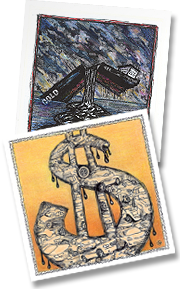
Number 3 in the series, 'Black Gold' (VDP), b/w 'Aquarium' (Saint-Saëns), features 2 sleeve illustrations provided by the legendary Frank Holmes, 'Black Gold' and 'Dollar Sign'.
Imaginary Liner Notes — 'Black Gold' and 'Aquarium' reviewed by Michael Leddy:
Disaster has long been the stuff of ballads — fires, floods, train-wrecks. In 'Black Gold' Parks makes a 21st-century environmental catastrophe, the Prestige oil spill, into the stuff of a ballad, beginning with the observations of an imagined bystander or crew member and shifting to a general contemplation of humankind and nature. The long trochaic lines, reminiscent of Edgar Allan Poe's 'The Raven', suggest the doomed ship's dangerous cargo "rolling in the hold", "back and forth in time for every swell." Performing this song in Chicago in 2010, Parks cried out "This is central!" And it is.
The Esso Trinidad Steel Band's performance of Camille Saint-Saëns's 'Aquarium' (from the 1886 'Carnival of the Animals') comes from the group's eponymous 1971 Warners album, produced by Parks (and now available on Bananastan). Following 'Black Gold', this recording sounds not only ethereal and mysterious but also eerily funereal: a lament for the ocean, played on oil drums.
Personnel
AMAZING GRACES
Players: The Van Dyke Parks Orchestra
Keyboards: VDP ("Carmen")
Mixed by: Ira Ingber at Muscletone Village Studio, West LA.
HOLD BACK TIME
Vocals: Van Dyke Parks
Backing vocals: Danny, Dash and Timothy Hutton
Guitars: Ira Ingber
Solo Cello: Cameron Stone
Mandola: Matt Cartsonis
Electric Bass: Carl Sealove
Keyboards: VDP
Percussion: Ian Zenith
Mixed by: Ira Ingber at Muscletone Village Studio, West LA.
Other Info
Catalogue No: B4503
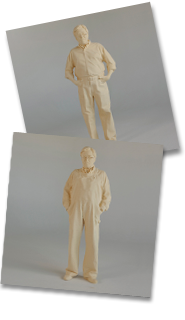
The fourth release, 'Amazing Graces' (Trad arr VDP) b/w 'Hold Back Time' (VDP) features life-size sculptures of Van Dyke by Charles Ray, entitled 'Side One' and 'Side Two' respectively.
Imaginary Liner Notes — 'Amazing Graces' and 'Hold Back Time' reviewed by Michael Leddy:
The instrumental 'Amazing Graces' showcases the keyboards of "The Van Dyke Parks Orchestra", with Parks recasting the most familiar of 19th-century hymn melodies, first as a full orchestration in 5/4 time, later as the plaintive single notes of an accordion. Think of this recording as music to accompany a sunlit American landscape.
'Hold Back Time', which first appeared on the 1995 Van Dyke Parks-Brian Wilson collaboration Orange Crate Art, is the fourth song from that album to take on a second life as a solo Parks recording. The lyrics celebrate the present — lovers in each other's arms — and the past — the making of a household and family in "our new old house by the track." Parks is joined here by Danny, Dash, and Timothy Hutton: two generations of sturdy voices defying "that old clock on the wall." The careful listener might notice the slight hesitation in each chorus, holding back "time" (the word), if only for the smallest moment.
Drawing upon the music of three centuries, these latter four recordings show us a musician of unflagging energy and imagination. If Van Dyke Parks, like Andrew Marvell, cannot hold back time, cannot make his sun stand still, he can indeed make that sun run.
Personnel
THE ALL GOLDEN
Piano and Vocal: Van Dyke Parks
SASSAFRAS
Concertmaster: Peter Kent
Solo Cello: Cameron Stone
Woodwinds: Chris Bleth
Mandocello: Matt Cartsonis
Electric Bass: Carl Sealove
Vocals: Danny, Dash and Timothy Hutton, Ira Ingber
Studio Recording Super:
Doug Lacy at "Some Pun'kins" Studios LA.
Mixed by: Ira Ingber at Muscletone Village Studio, West LA.
Other Info
Catalogue No: B4504
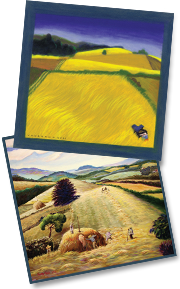
The 5th installment, 'The All Golden' (VDP), b/w 'Sassafras' (Billy Edd Wheeler) is illustrated by both the legendary Klaus Voormann and Billy Edd Wheeler.
Imaginary Liner Notes — 'The All Golden' and 'Sassafras' reviewed by Michael Leddy:
The final instalments of Van Dyke Parks' singles project look southward, with a song written for a friend and fellow musician, a song by a fellow songwriter, a song for Parks' home state, and a setting of a song from one of the oldest traditions of American music, the Sacred Harp.
'The All Golden' is Parks' portrait of his friend Steve Young, guitarist, singer, and songwriter. The song first appeared in an orchestral arrangement on Song Cycle (1967), returning in shortened form for voice and piano on Moonlighting: Live at the Ash Grove (1998). In this new (full-length) recording, the piano has a more extroverted role, sometimes capturing details of the original arrangement with uncanny fidelity, sometimes adding new, seemingly effortless flourishes. The other supporting voice is that of Carmen, Parks' century-old Hohner accordion. The pentatonic phrases at the beginning of 'The All Golden' evoke Edward MacDowell, and the ghost of 'John Brown's Body' that appears later in the song suggests Charles Ives' penchant for American quotation. The punning wordplay of the song's lyric though is all Parks. 'The All Golden' is durable goods.
Like 'The All Golden'‚ 'Sassafras' is a song with some history. The song's composer, the musician, painter, and playwright Billy Edd Wheeler, recorded 'Sassafras' in 1961. A recording by the Modern Folk Quartet followed in 1963, and in 1967 one by the West Coast Pop Art Experimental Band, the group that recorded an instrumental version of Parks' 'High Coin' (and with whom Parks sometimes played piano). 'Sassafras' tells the tall tale of the singer's courtship of a "little-bitty woman" whose kisses are powerful enough to dry up swimming holes and darken the sky. Parks' arrangement turns the song into an in an unabashed production number, suggesting both the sonic density of Song Cycle and the jubilant Americana of Jump!
Personnel
MISSIN' MISSIPPI
Concertmaster and Violin Solo: Peter Kent
Cellos: Cameron Stone
Guitar: Ira Ingber
Electric Bass: Carl Sealove
Female Vocal: Gaby Moreno
THE PARTING HAND
Concertmaster and Violin Solo: Peter Kent
Cello: Cameron Stone
Bass: Dave Stone
Mandocello: Matt Cartsonis
Vocals: David P Jackson, Doug Lacy, Ira Ingber, VDP
Recorded by: Doug Lacy and Ira Ingber at "Some Pun'kins" Studios, LA, and Muscletone Village Studio, West LA.
Other Info
Catalogue No: B4505
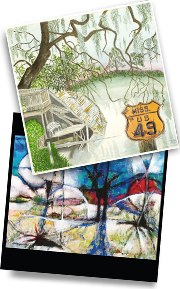
The sixth, 'Missin' Missippi' (VDP), b/w 'The Parting Hand' (Trad arr VDP) has sleeve art by Sally Parks and Stanley Dorfman.
Imaginary Liner Notes — 'Missin' Missippi' and 'The Parting Hand' reviewed by Michael Leddy:
Like 'Black Gold', 'Missin' Missippi' memorializes disaster: the devastation that struck Pass Christian, a small Mississippi town on the Gulf of Mexico, eighty miles south of Parks' birthplace of Hattiesburg. "First Camille and then Katrina/Took the dream and then the dreamer." Pass Christian was nearly destroyed by hurricanes in 1969 and 2005. The town has a particular significance for Parks: it was for a short time the home of one of his musical heroes, the composer and pianist Louis Moreau Gottschalk (1829-1869), whose family moved there in 1832 to escape a cholera epidemic in New Orleans. It was in Pass Christian that young Moreau began to play the piano. This song in remembrance of things past has a surprising musical bonus: the mournful blues motif comes from the first movement of Maurice Ravel's 'Piano Concerto in G'.
'The Parting Hand' is an 1835 hymn from the tradition of unaccompanied choral music known as the Sacred Harp. 'The Parting Hand (Variations)' begins as a performance by a chorus, then shifts to an interlude for strings and harmonica. Fragments of other songs float past: 'Leaning on the Everlasting Arms', 'I Ride an Old Paint'. The effect recalls side one, track one of Song Cycle, where a snippet of 'Black Jack Davy' performed by Steve Young, gives way to Randy Newman's 'Vine Street'. 'The Parting Hand' is a traditional choice to close a Sacred Harp convention, as those gathered shake hands and prepare to part:
"O could I stay with friends so kind,
How would it cheer my drooping mind!
But duty makes me understand,
That we must take the parting hand."
Journeying from Malibu to Paris to Madagascar to Wall Street to Trinidad to Galicia to Mississippi and beyond, these recordings are the work of a musician whose windshield is bigger than his rear-view mirror. Fare forward, traveller.
Michael Leddy
March 2012
All Sleeve Art for this Singles project was generously contributed by the Artists.
